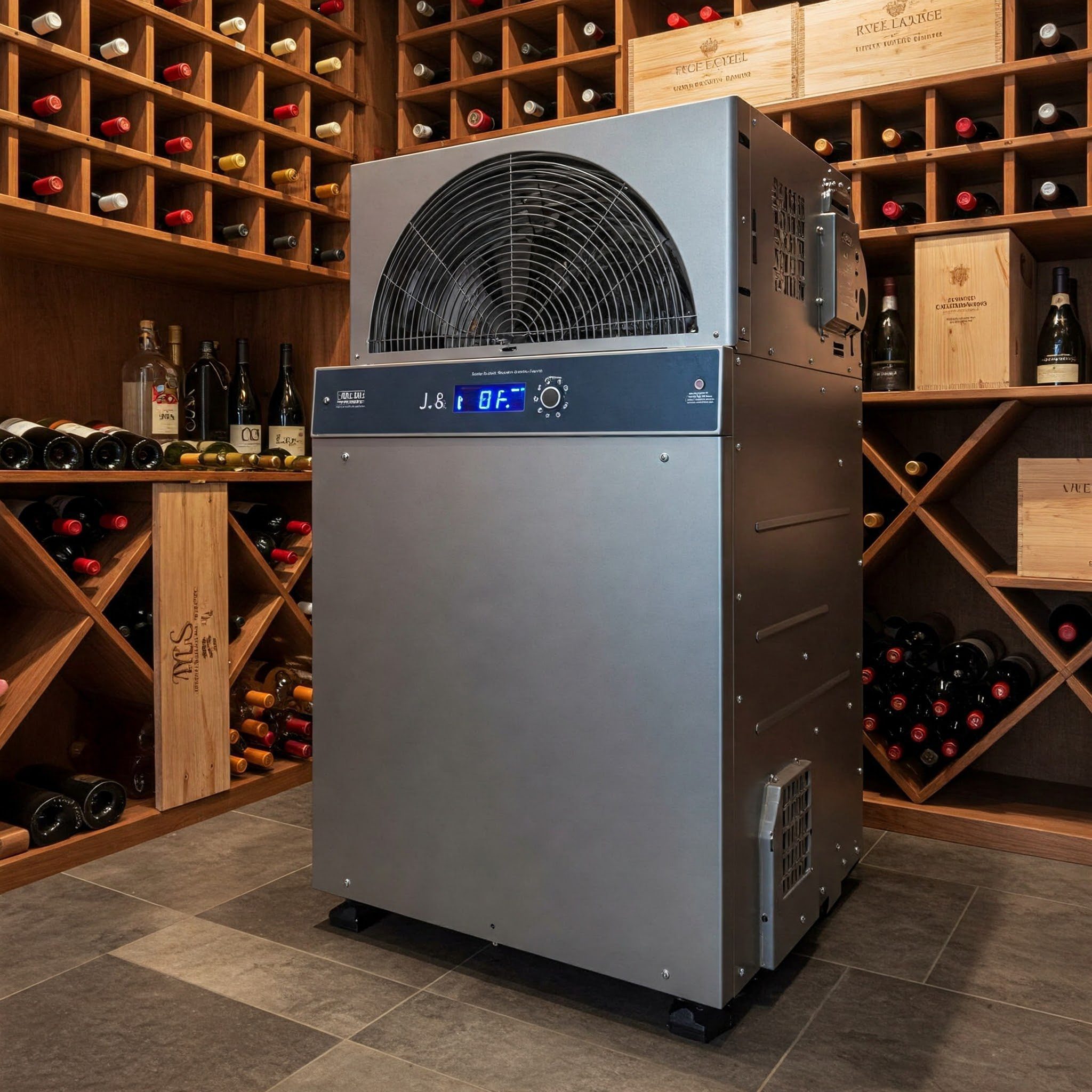Cellar Cooling: Maintaining Optimal Conditions for Beverage Storage
Cellar cooling systems are specialized refrigeration units designed to maintain the ideal temperature and humidity for storing beverages such as beer, wine, and soft drinks. Essential for pubs, bars, restaurants, and breweries, these systems ensure that drinks remain fresh and at the perfect serving temperature.
What Is Cellar Cooling?
Cellar cooling refers to refrigeration systems that regulate temperature and humidity in beverage storage areas, typically beer cellars and wine rooms. Unlike conventional refrigeration, these units are designed for large spaces and maintain consistent conditions to preserve the taste, quality, and shelf life of stored beverages.
Key Features of Cellar Cooling Systems
- Precise Temperature Control
- Keeps beer cellars at 10°C to 12°C and wine cellars at 8°C to 14°C.
- Humidity Regulation
- Prevents excess moisture buildup or drying out of cork-sealed bottles.
- Air Circulation Systems
- Ensures even cooling and prevents temperature fluctuations.
- Energy Efficiency
- Low-energy systems reduce running costs while maintaining performance.
- Remote and Split Systems
- Allows for flexible installation with indoor and outdoor units.
- Automatic Defrosting
- Prevents ice buildup for consistent cooling efficiency.
- Durable Construction
- Designed for commercial environments, ensuring longevity and reliability.
- Quiet Operation
- Minimal noise levels to maintain a comfortable working environment.
Types of Cellar Cooling Systems
1. Through-the-Wall Systems
- Compact and easy to install, ideal for small cellars.
- Includes a built-in evaporator and condenser.
2. Split System Cellar Coolers
- Separate indoor and outdoor units reduce heat buildup inside the cellar.
- Suitable for larger storage areas.
3. Remote Cooling Systems
- Compressor and condenser are placed externally to minimize noise and heat.
- Common in high-capacity bars and breweries.
4. Wine Cellar Cooling Units
- Designed specifically for maintaining stable humidity and temperature for wine aging.
- Can be ducted or wall-mounted depending on space constraints.
Applications of Cellar Cooling
- Pubs and Bars
- Keeps beer kegs at the perfect temperature for smooth dispensing.
- Restaurants and Hotels
- Ensures wine and beverages are stored correctly for premium service.
- Breweries and Taprooms
- Preserves the integrity of craft beers and specialty drinks.
- Wine Cellars and Retail Outlets
- Ideal for storing wines long-term without spoilage.
- Catering and Event Venues
- Ensures large beverage storage areas remain at optimal conditions.
Benefits of Cellar Cooling Systems
- Preserves Beverage Quality
- Prevents spoilage, oxidation, and off-flavors.
- Improves Serving Conditions
- Ensures drinks are dispensed at the correct temperature for customer satisfaction.
- Reduces Wastage
- Prevents excess foaming and flat beer from improper storage conditions.
- Energy Savings
- Modern systems are highly efficient, lowering operating costs.
- Enhances Shelf Life
- Keeps beverages fresher for longer, maximizing product longevity.
- Customizable Options
- Available in various sizes and configurations to suit different storage needs.
Choosing the Right Cellar Cooling System
- Storage Capacity
- Consider the volume of beverages that need to be cooled.
- Space Availability
- Choose between wall-mounted, ducted, or split systems based on cellar layout.
- Temperature Requirements
- Ensure the system supports the ideal temperature for stored products.
- Noise Levels
- Opt for quieter models, especially for venues with customer access to the storage area.
- Energy Efficiency
- Select eco-friendly units to reduce electricity consumption.
- Ventilation Needs
- Ensure proper airflow to maintain stable cooling performance.
- Ease of Maintenance
- Look for models with automatic defrost and easy-access components.
Maintenance Tips for Cellar Cooling Systems
Daily Maintenance
- Monitor Temperature: Ensure settings remain within the correct range.
- Inspect Doors and Seals: Check for leaks to prevent temperature loss.
Weekly Maintenance
- Clean Air Filters: Remove dust buildup to maintain efficient airflow.
- Check for Leaks: Ensure no refrigerant leaks or condensation issues.
Monthly Maintenance
- Inspect Fans and Coils: Clean to prevent dust accumulation affecting performance.
- Check System Performance: Ensure even cooling throughout the cellar.
Annual Maintenance
- Professional Servicing: Have a technician inspect refrigerant levels and electrical components.
- Calibrate Sensors: Ensure accurate temperature readings.
Troubleshooting Common Issues
- Inconsistent Cooling
- Cause: Blocked vents or failing compressor.
- Solution: Clean vents and call a technician if the issue persists.
- Excessive Noise
- Cause: Loose components or worn-out fans.
- Solution: Tighten screws or replace faulty parts.
- High Energy Consumption
- Cause: Dirty filters or inefficient insulation.
- Solution: Clean filters and check for proper sealing.
- Frost or Ice Build-Up
- Cause: Faulty thermostat or poor airflow.
- Solution: Adjust settings and ensure vents are clear.
- Moisture or Condensation
- Cause: High humidity levels.
- Solution: Improve ventilation and check humidity settings.
Troubleshooting Guide: Beer Cellar Cooler Fault Codes & UK Cellar Cooling Systems
Introduction: Keeping a pub or bar cellar at the proper temperature (usually around 12°C) is crucial for beer quality and stock longevity. Cellar cooling systems are specialized refrigeration units (often split systems with an indoor evaporator and outdoor condenser) designed to reliably hold 8–13°C in beer cellars – far cooler than standard air conditioning can achieve. Unlike ducted HVAC units, split cellar coolers are purpose-built for low-temperature operation and continuous duty. In this guide, we focus on the top 10 cellar cooling brands in the UK and their most popular models. For each, we outline common faults, symptoms, error/fault codes, and provide a troubleshooting table mapping issues to diagnostic steps and technician-level fixes. This technician-practical guide is written for UK venue owners and managers – helping you understand your beer cellar refrigeration system’s behavior (without venturing into DIY repair beyond basic checks). We’ve also included links to official vendor manuals (PDFs) for in-depth reference. (Note: This guide is about diagnosing and repairing existing systems – it does not cover purchasing advice.)
How to Use This Guide: If your pub cellar cooler is not working or showing alarm codes, find your unit’s brand/model below. Review the listed faults and symptoms (e.g. “compressor not running,” “coil icing,” “error code displayed”) and follow the diagnostic steps. Always prioritize safety – F-gas regulations require certified technicians for handling refrigerants. Venue staff can perform basic visual checks (power supply, clearing airflow obstructions, resetting accessible controls), but deeper troubleshooting (e.g. refrigerant checks or electrical repairs) should be left to qualified technicians. Use the tables and cited manual links to communicate effectively with your refrigeration engineer. By recognizing common cellar cooling fault codes and symptoms early, you can prevent prolonged downtime of your beer cellar cooling.
Top 10 UK Cellar Cooling Brands & Models
Below are ten leading cellar cooler brands in the UK hospitality sector, focusing on split system coolers commonly found in bar and pub cellars. Each entry lists the brand’s popular model(s), typical issues (symptoms and error codes), and a link to the official manual for further detail. We then provide a troubleshooting table for that model, mapping each issue to diagnostic steps and fixes.
1.J & E Hall – JCC Series Cellar Coolers
2. BeerMaster (Wolseley Climate) – BM & BM+ Series
3. Marstair – Cellarator / MRC+ Series
4. Qualitair – ICC & QP Premium Series
5. Hubbard – LiteAir & HCR Range
6. KD (Kelvin/Kooltech) – CellarStar SC Series
7. IMI Cornelius – CellarKing Systems
8. Searle / Kelvion – CellarMaster Units
9. Blizzard / Pentland – BCS Series (OEM by Qualitair)
Downloadable Manual Links
For further reading and reference, here are links to official manuals and technical resources for the models discussed above. These PDFs contain detailed wiring diagrams, error code charts, and service instructions from the manufacturers:
-
J&E Hall JCC Series – Technical Manual: J&E Hall Cellar Cooler System Troubleshooting Guide – A two-page diagnostic chart for JCC units.
-
Wolseley BeerMaster Plus – Installation & Maintenance Manual: Covers BeerMaster BMIEP/BMOP systems, including fault codes and wiring.
-
Marstair Cellarator (CXE/MRC) – Fault Finding Guide: Available from Marstair’s site as Cellar Cooler Fault Finding (PDF flowchart for troubleshooting).
-
Qualitair Premium Cellar Cooler – Product Manual: Contact Qualitair or distributors for the ICC/Invicta series manual. Key info (specs, features) can be found in product guides.
-
Hubbard LiteAir – Installation Guide: Hubbard LiteAir Cellar Cooling Manual (covers LC/LE model installation, operation, troubleshooting).
-
KD CellarStar – User/Installation Manual: Provided by suppliers like Carlton or Kooltech; includes Dixell controller parameter list and wiring diagrams. (Look for KD SC Series Installation Manual).
-
IMI Cornelius CellarKing – (Legacy): Refer to Cornelius product manual 58-0908 or similar if available; otherwise generic refrigeration service manuals apply.
-
Searle (Kelvion) Cellar Cooling – Technical Data:
kelvion_searle_coolers_installation_1 Searle’s old catalogs might list CellarMaster unit data; Kelvion can provide heat exchanger specs if needed.
Conclusion & Technical Notes
Maintaining a pub cellar cooling system is vital for protecting your inventory and ensuring your pints are served at the perfect temperature. By understanding the common fault codes, symptoms, and fixes for the top cellar cooler brands, you can address minor issues proactively and communicate effectively with refrigeration technicians for bigger problems. Always prioritize regular maintenance: keep condensers clean, check fans and drains, and schedule annual services where a tech can top up refrigerant (if needed) and test safety controls.
Remember that split-system cellar coolers operate under heavy load – many run 24/7 in often dusty, confined environments. Little things like cleaning a coil or tightening a wire can prevent major breakdowns. Also, adhere to F-Gas regulations for refrigerant handling: if you suspect a leak, have it repaired by certified engineers and don’t just continuously top up gas, as that’s illegal and harmful to efficiency. Use the controller’s features to your advantage: many have alarm outputs – hooking that to an audible alarm or text alert can save you if the cellar warms up unexpectedly. And don’t ignore those alarm codes – a flashing “P1/OC” or “E1” today could mean a simple sensor swap rather than spoiled beer tomorrow.
In the UK, the cellar cooling market is well-supported. Brands like J&E Hall, BeerMaster, Marstair, and others we’ve covered have technical helplines and readily available spares. We’ve provided manual links so you can dive deeper into vendor-backed procedures. When in doubt, consult those PDFs – for example, J&E Hall’s guide provides step-by-step checks for a compressor not starting, and Marstair’s FAQ explains exactly what to do if your unit is hitting HP or LP trip limits. Using such resources can often demystify an issue.
Finally, safety note: while this guide empowers you with knowledge to troubleshoot, always work within your competence and legal limits. Electrical components, high pressures, and refrigerants can be hazardous. If an error code or symptom points to a serious issue (compressor fault, major leak, etc.), call a qualified refrigeration engineer. It’s better to have a brief outage and professional repair than to risk injury or product loss from a DIY attempt gone wrong. With a proper understanding of your beer cellar refrigeration troubleshooting steps and regular care, your cellar cooling system will reward you with years of reliable service – keeping the beer (and your business) cool even when things heat up. Cheers to a perfectly cooled pint, every time!


